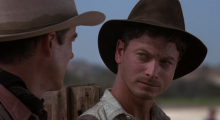6576 Results for “production”
-
Bringing the Short Film The Quarry to the Tribeca Film Institute’s Through Her Lens Program

Sonejuhi Suha is an award-winning filmmaker, working in both narrative and documentary storytelling. Her narrative short film, Love Comes Later, premiered in competition at the Cannes Film Festival and screened at over 60 film festivals internationally, garnering awards at festivals. Below is her guest blog post on her experience with Tribeca’s Through Her Lens Program. Her short film script The Quarry, selected for THL, is a psychological drama about a gynecologist and abortion provider, Reese, who practices in a remote town in America. When a threat emerges in town and Reese finds herself drawn into a rabbit hole of paranoia, […]
by Sonejuhi Sinha on Nov 8, 2016 -
“This is a Show about Dread”: Nick Antosca on the SyFy Series, Channel Zero

Although the Netflix series Stranger Things has received more mainstream attention, the Syfy series Channel Zero is arguably more unsettling and less predictable, and executed with a more determined vision. With six episodes this season (“Candle Cove”) and six in production for 2017 (“The No-End House”), the series has more in common with the French horror series Beyond the Walls (Shudder) in terms of its willingness to allow for slowness and its non-clichéd approach to characters. Both shows suggest the increasing prominence of, for lack of a better term, “weird fiction” — stories that treat horror as a kind of […]
by Nicholas Rombes on Nov 4, 2016 -
Tips for Writing a Micro-Budget Feature

The following guest essay is from filmmaker Darren Coyle, whose feature The Hunt is currently crowdfunding for production. I have written and directed a bunch of short films, and I’ve even gotten them into a few festivals where they received some awards. I enjoyed working on short films but wanted to write and direct a feature. The problem is, features are expensive and I don’t have connections or know any rich people. So, I thought I would make the feature myself using the resources I have: time, friends, and talent. What needs to go into a movie? People, places and words […]
by Darren Coyle on Nov 3, 2016 -
Notes on Under the Gun (Or, When is Fiction a Crime?)

A work of art teaches you how to look at it. It builds its own user guide. In nonfiction, the user guide includes such FAQs as: how should one interpret this work of art’s relationship to reality? What type of trust should a viewer grant or deny it? And how does this film conceive of truth and beauty, which are sometimes but not always the same thing? Some documentaries come with confusing manuals. Some are purposely confusing; others are just confused. These films are “problematic” in the way they subvert expectations about the terms of the documentary promise. They push […]
by Penny Lane on Nov 3, 2016 -
10 Lessons on Filmmaking from Viggo Mortensen

In his latest film, Captain Fantastic, Viggo Mortensen plays Ben, a man intent on raising his children on his own terms in the wild forests of the Pacific Northwest. When he learns of his wife’s sudden death, he must uproot his family from the life they are accustomed to and try to find their own path back in civilization. The film had an incredibly successful festival run after its Sundance premiere, picking up top awards in Cannes, Deauville and Karlovy Vary. And recently, the film picked up the Audience Award at the Rome Film Fest, where Mortensen and director Matt […]
by Ariston Anderson on Nov 2, 2016 -
Gary Sinise’s Of Mice and Men: An Appreciation

One of the great filmmaking misconceptions familiar to anyone who’s ever read a screenwriting manual (or spent time with low-level Hollywood development executives) is the notion that movies are external and books are internal — that the advantage that literature has over cinema is that it can tell us what people are thinking. This canard that movies aren’t good at conveying characters’ thoughts has endured in spite of how easily disproven it is. Even a casual study of Bergman or Ozu, or more recently Barry Jenkins’ Moonlight, confirms the exact opposite truth: that depicting characters’ interior lives is one of the […]
by Jim Hemphill on Nov 2, 2016 -
Watch: A Scorsese Fast Dolly Zoom-In Supercut

From faces to guns to cocaine to pasta sauce, the fast dolly zoom-in is one of Martin Scorsese’s go-to expressive camera moves. Here, Jorge Luengo Ruiz compiles four-minutes of them in what is both great mid-day cinematic eye candy as well as something of a critique. Ruiz writes: Martin Scorsese’s penchant for a specific kind of zoom, one where he runs the camera right up to the face of his subject, falls somewhere in between the subtle and the obnoxious. Seduced as we are by the style and panache of Scorsese’s oeuvre, we let this habit of his pass us […]
by Scott Macaulay on Nov 1, 2016 -
“Student Filmmaking at its Finest”: Don Coscarelli on Phantasm

The first filmmaker I ever interviewed was Don Coscarelli. It was 1998 and I was a junior in college, toiling away at the University of Kentucky student newspaper. Coscarelli agreed to chat about his career for the paper’s Halloween movie page and, clueless as to proper interview decorum — or what might be an appropriate amount of time to monopolize — I asked him about every movie he had ever made. Every. Single. Movie. It was a Frost-Nixon length tête-à-tête, but he was nice enough to humor me. Two decades later — and on the eve of another Halloween — I had […]
by Matt Mulcahey on Oct 31, 2016 -
“When I Looked at All the Ways You Can Fail in VR, That Was a Turn-On”: Doug Liman on His VR Sci-Fi Thriller, Invisible

Released today, Invisible is director Doug Liman’s first foray into virtual reality, a five-part science-fiction thriller that places viewers in the midst of a tale involving corporate secrets, future tech and family treachery. The series takes off from the question one sometimes mulls: what superpower would I choose for myself? Says producer Julina Tatlock of the production company 30 Ninjas, “One of the top superpowers people would choose is invisibility — and we’ve all dreamed about being rich. By creating Invisible in VR, we are able to immerse the viewer into that glam, exotic and at times terrifying world in […]
by Scott Macaulay on Oct 27, 2016 -
Beyond Telefilm Canada: Curating the Future of Canadian Film at VIFF’s “Future//Present”

What does a Canadian film look like? This could be construed as a bad joke with limitless punch lines, the film equivalent of “a man walks into a bar…” But this query isn’t meant to drag my own national cinema, which has produced great filmmakers like Alanis Obomsawin, David Cronenberg and Michael Snow. Instead of a set-up to a gag, this line of questioning opens a conversation about the future of Canadian cinema, especially when it comes to funding. This topic was front of mind at the Vancouver International Film Festival this year, which debuted a new program, curated by […]
by Kiva Reardon on Oct 27, 2016










